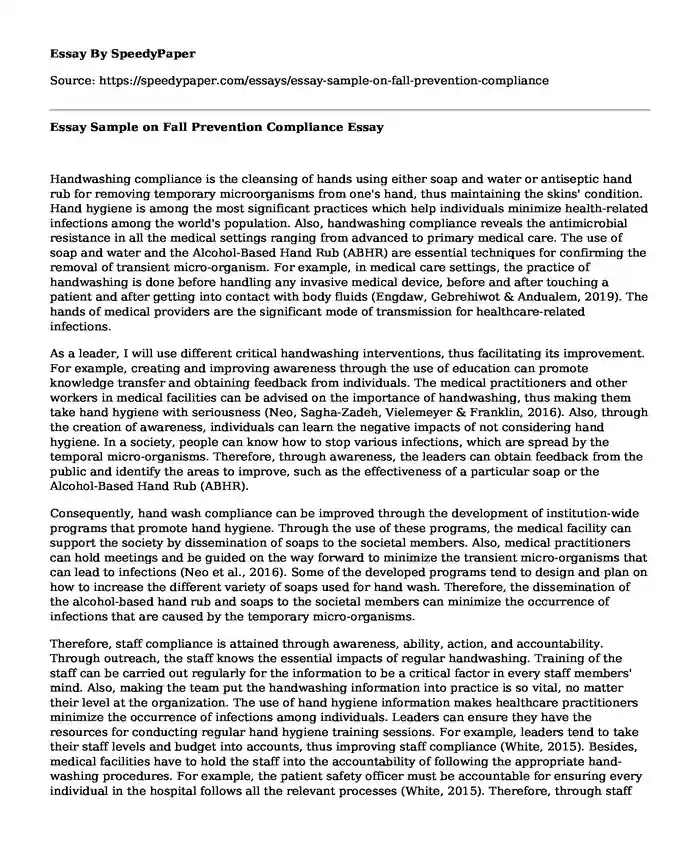
| Type of paper: | Essay |
| Categories: | Community health |
| Pages: | 3 |
| Wordcount: | 662 words |
Handwashing compliance is the cleansing of hands using either soap and water or antiseptic hand rub for removing temporary microorganisms from one's hand, thus maintaining the skins' condition. Hand hygiene is among the most significant practices which help individuals minimize health-related infections among the world's population. Also, handwashing compliance reveals the antimicrobial resistance in all the medical settings ranging from advanced to primary medical care. The use of soap and water and the Alcohol-Based Hand Rub (ABHR) are essential techniques for confirming the removal of transient micro-organism. For example, in medical care settings, the practice of handwashing is done before handling any invasive medical device, before and after touching a patient and after getting into contact with body fluids (Engdaw, Gebrehiwot & Andualem, 2019). The hands of medical providers are the significant mode of transmission for healthcare-related infections.
As a leader, I will use different critical handwashing interventions, thus facilitating its improvement. For example, creating and improving awareness through the use of education can promote knowledge transfer and obtaining feedback from individuals. The medical practitioners and other workers in medical facilities can be advised on the importance of handwashing, thus making them take hand hygiene with seriousness (Neo, Sagha-Zadeh, Vielemeyer & Franklin, 2016). Also, through the creation of awareness, individuals can learn the negative impacts of not considering hand hygiene. In a society, people can know how to stop various infections, which are spread by the temporal micro-organisms. Therefore, through awareness, the leaders can obtain feedback from the public and identify the areas to improve, such as the effectiveness of a particular soap or the Alcohol-Based Hand Rub (ABHR).
Consequently, hand wash compliance can be improved through the development of institution-wide programs that promote hand hygiene. Through the use of these programs, the medical facility can support the society by dissemination of soaps to the societal members. Also, medical practitioners can hold meetings and be guided on the way forward to minimize the transient micro-organisms that can lead to infections (Neo et al., 2016). Some of the developed programs tend to design and plan on how to increase the different variety of soaps used for hand wash. Therefore, the dissemination of the alcohol-based hand rub and soaps to the societal members can minimize the occurrence of infections that are caused by the temporary micro-organisms.
Therefore, staff compliance is attained through awareness, ability, action, and accountability. Through outreach, the staff knows the essential impacts of regular handwashing. Training of the staff can be carried out regularly for the information to be a critical factor in every staff members' mind. Also, making the team put the handwashing information into practice is so vital, no matter their level at the organization. The use of hand hygiene information makes healthcare practitioners minimize the occurrence of infections among individuals. Leaders can ensure they have the resources for conducting regular hand hygiene training sessions. For example, leaders tend to take their staff levels and budget into accounts, thus improving staff compliance (White, 2015). Besides, medical facilities have to hold the staff into the accountability of following the appropriate hand-washing procedures. For example, the patient safety officer must be accountable for ensuring every individual in the hospital follows all the relevant processes (White, 2015). Therefore, through staff compliance, the medical facility can play an essential role in promoting hand hygiene, thus reducing the spread of infections to the public.
References
Engdaw, G. T., Gebrehiwot, M., & Andualem, Z. (2019). Hand hygiene compliance and associated factors among health care providers in Central Gondar zone public primary hospitals, Northwest Ethiopia. Antimicrobial Resistance & Infection Control, 8(1), 190. Retrieved from https://aricjournal.biomedcentral.com/articles/10.1186/s13756-019-0634-z
Neo, J. R. J., Sagha-Zadeh, R., Vielemeyer, O., & Franklin, E. (2016). Evidence-based practices to increase hand hygiene compliance in health care facilities: an integrated review. American journal of infection control, 44(6), 691-704. Retrieved from https://www.ajicjournal.org/article/S0196-6553(15)01227-4/fulltext
White. J. (2015). Hand hygiene: Keys to compliance. Health Treatment & Outcomes. Retrieved from http://www.healthcarebusinesstech.com/hand-hygiene-leapfrog/
Cite this page
Essay Sample on Fall Prevention Compliance. (2023, Mar 29). Retrieved from https://speedypaper.net/essays/essay-sample-on-fall-prevention-compliance
Request Removal
If you are the original author of this essay and no longer wish to have it published on the SpeedyPaper website, please click below to request its removal:
- Career Advice Essay Samples
- Brand Equity Market Research. Free Essay.
- Essay Example Dedicated to Licensing and Credentialing Physicians
- Essay Example on Titanic Technology and Security
- Free Essay on Eyewitness History: Alexander the Great
- Paper Example on Evidence Based Practice: Patient Fall
- Research Paper on the Importance of Nursing Practice
Popular categories




